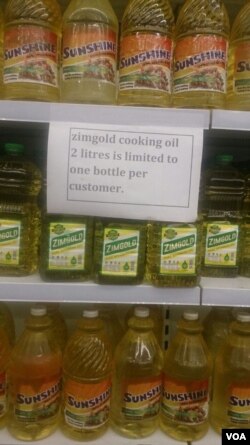Panic buying of basic commodities has hit Harare as authorities mull introducing bond notes in October, widely opposed by most Zimbabweans, who lost personal savings when the country dumped the local dollar in 2009.
A snap informal survey in Zimbabwe’s capital city shows that some people are now hoarding basic commodities in anticipation of a looming food crisis due to the current cash crisis and after the introduction of bond notes.
One such skeptical consumer is Mabelreign resident Rosemary Chinyadza, who said the current cash crisis might result in serious food shortages almost like what Zimbabweans witnessed at the height of the nation’s economic recession between 2007 and 2008.
The bulk purchasing of commodities has forced some shops to start limiting the purchasing of certain commodities. For example, a retail shop in Harare’s central business district was today limiting the purchasing of a two-liter cooking oil bottle to one bottle per customer.
Several shop owners in Harare say they are witnessing panic buying of basic commodities with some customers expressing dismay over the current cash crisis, which has resulted in most of them spending a lot of time in back queues. The situation is being worsened by the central bank’s moves to introduce bond notes.
Linda Masirarambi, who works for a local company that operates from the city’s central business district, said instead of concentrating on her job, she is now spending most of her time in bank queues looking for cash.
Masarirambi said she is unable to feed her family due to lack of cash to buy basic commodities.
Gibson Zindove, who runs a car repair business in Avondale, said he is no longer depositing money in banks because it would be difficult for him to access it when he wants to finance his business operations.
Another company that is struggling to get cash for its operations is Gutu and Chikowero Attorneys, a law firm co-directed by MDC-T national spokesman Obert Gutu.
Gutu said they are now failing to pay some of workers without bank accounts.
Banks are restricting cash withdrawals for individuals to at least $50 per day.
He said many people are spending a lot of time in bank queues instead of engaging in productive work.
Reacting to the questions on panic buying and cash shortages, Lovemore Kadenge, president of the Zimbabwe Economics Society, said failure by most companies to access cash from banks was affecting the national economy.
Kadenge urged Zimbabwean authorities to come up with policies that would restore confidence in the financial services sector and stop panic buying of basic commodities.
Government sources told Studio 7 that Reserve Bank of Zimbabwe governor John Mangudya was under pressure from unnamed senior government and ruling Zanu PF party officials to shelve his plans to introduce bonds following a public outcry and the prevailing cash shortages.
Mangudya has already said the bond notes, designed to boost Zimbabwe’s exports, would be introduced in October this year. At the same time, Finance Minister Patrick Chinamasa issued a statement Monday saying government was consulting the World Bank and the International Monetary Fund on the bond notes or coupons.








